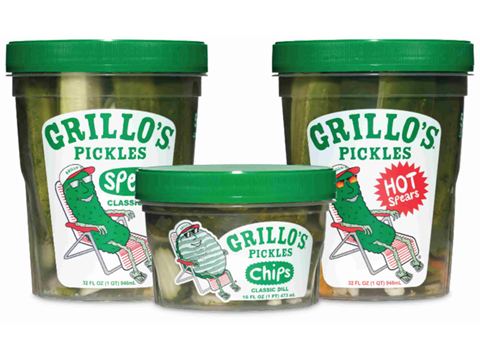
Berry has partnered with Grillo’s Pickles to deliver ‘widely recyclable’ polypropylene (PP) jars with a continuous thread closure for its pickles, aiming to provide a simple, mess-free opening process.
Berry says the custom jars were designed for compatibility with its line of ribbed closures to help prevent leakage during opening and closing. The jars also include pickle-shaped side grips for user control and in-mould labels to maintain Grillo’s aesthetic. This is said to help simplify the filling line process by eliminating the need for label application.
The company claims the twist-top jars improve the recyclability of traditional pickle jars, typically made of glass. The jars are also nestable in an effort to minimize wasted space during transportation and storage and help optimize supply chain efficiency.
The jars were designed for Grillo’s in collaboration with Blue Clover Studios, Berry’s internal design studio, following an ideation workshop at the company’s headquarters in Evansville, Indiana. The jars and closures are produced at Berry’s plants in Streetsboro, Ohio and Evansville, Indiana.
“We initiated a custom jar exploration with Berry Global to address our biggest consumer complaint, spillage when opening our original jar,” said Adam Kaufman, president and CEO of Grillo’s Pickles. “We knew when we updated our packaging, we wanted it to be a step-change for the business. We wanted the quality of our packaging to match the quality of our product. We are confident we’ve achieved that result.”
Last month, Berry announced its distribution of a customizable, rectangular HDPE bottle solution for the beauty, home, and personal care sectors, available with up to 100% post-consumer recycled plastic. The bottle’s neck is compatible with various caps and closures, including Berry’s Wave2cc all-plastic dispenser.
The company also unveiled a range of stackable polypropylene bowls and lids earlier in the year, intended to unlock reuse in foodservice applications and align with developing packaging legislation. Intended for long-term durability, the bowls’ matte outer surface is said to be scratch-resistant, while the smooth inner surface claims to minimize the growth of bacteria for food preservation.
If you liked this story, you might also enjoy:
How are the top brands progressing on packaging sustainability?
Sustainable Innovation Report 2024: Current trends and future priorities
Reuse vs. single use – which is better for the environment?
The ultimate guide to global plastic sustainability regulation













No comments yet